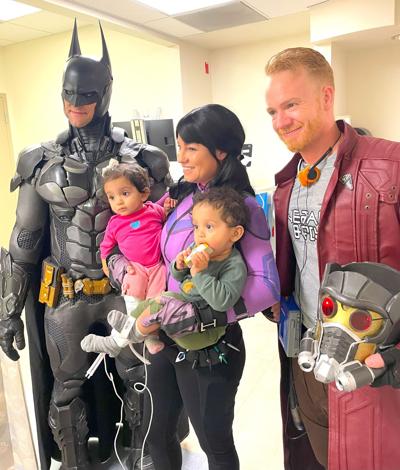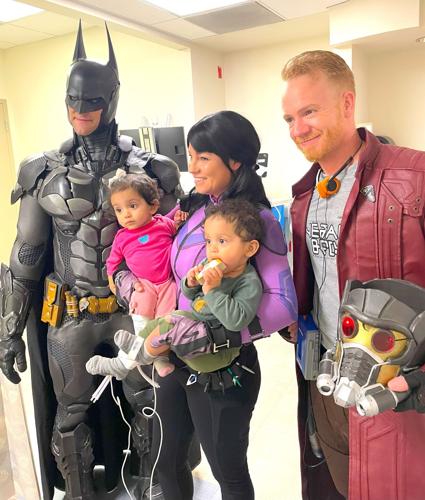Imagine joining forces with Batman in bringing a lawbreaker to justice or teaming up with Wonder Woman to save the human race from a worldwide cyber attack. These are the kinds of wild fantasies we all had as kids and today’s children are no different — including the ones who are coping with in-patient treatment for a variety of ailments.
Jason Golden was one of those youngsters years ago who waged his own grueling battle versus cancer. A favorite pastime that carried him through the physical and mental trials, however, were comic books provided by his parents, which afforded the young survivor a pleasurable escape from his daily grind.
Holding on to those sweet memories, Golden went on to become the founder of Critical Care Comics in 2012, a nonprofit specializing in arranging visits with sick children in the interest of gifting them with comic books, games, plushies and a variety of toys.
Charleston-born Casey Keene joined the Las Vegas-based outfit in 2020, where she now serves as a board member and the organization’s Director of Operations. And while those titles may give one the impression that she’s your run-of-the-mill paper pusher, Keene assumes her secret identity as Squirrel Girl, when joining her colleagues on hospital visits.
Over the years, Critical Care Comics has grown to the tune of 105 members serving multiple US markets, which now includes New York City and Charleston, along with Los Angeles as a long-range target destination.
Keene has recently been hard at work in fostering relationships with healthcare providers in the Holy City, such as the MUSC Children’s Hospital, where superheroes of Marvel and DC Comics fame will drop in on the hospital venue on May 17.
Promoting the Critical Care Comics mission of bringing smiles through 28-page comic books has extra meaning for Keene, whose own mother is presently undergoing cancer treatment.
“It’s incredible, especially with the younger kids that really think we are the superheroes coming in. Some of them are a little afraid. My character doesn’t wear a facemask or face shield, so they can see my eyes. So, usually I’ll go in first if a kid is scared,” said Keene when describing a typical hospital visit.
“More than once, I’ve been told by parents as we were leaving that it was the first time they’ve seen their child smile in days. And the nurses tell us that the kids talk about it for days afterwards and it just gives them a really cool escape.”
With those bright smiles, though, also come heartbreaking moments, per Keene, who recounted a recent meeting with a pair of siblings who had just lost their father in a fatal car accident. One of the children, she added, wondered aloud if the outcome might have been different had Spiderman been on the scene.
The comic books themselves introduce youngsters to a more “unique vocabulary,” continued Keene, in addition to opening a whole new world to the young readers, which ultimately imbues them with a morale boost whether they’re at home or in a hospice setting.
During their hospital trips, Keene and company may spend up to three hours making the rounds, as they’re often accompanied by a child life specialist who will communicate background information on each younster before the costume-clad visitors engage with the patients.
MUSC Child Life Manager Betsy McMillan is collaborating with Critical Care Comics to help make the superheroes debut in Charleston a rousing success.
“Superheroes are classic toys, and their stories are well known to many children and adults. The hero part of it brings kind of that awe when they get to see them in real life,” observed McMillan in explaining the reasoning behind her facility’s latest venture to enhance the in-patient experience.
Collectively, McMillan and her staff are committed to show their young patients that MUSC isn’t a sterile clinical space. And while the facility is primarily designed for the physical care of children, she offered, her team is careful not to lose sight of the psychosocial aspect of their stay at the hospital.
“So having events that speak to children on their level, things that they can relate to, makes the hospital not such a negative place. It also gives them positive memories,” shared McMillan. “And so, the children will go home talking about the superheroes that they met in the hospital instead of some of the more challenging things like having an IV placed or blood drawn, or having surgery. Children have a way to filter out the negative and really focus on the positive.”
Visit www.criticalcarecomics.org to place a donation to the nonprofit group.




